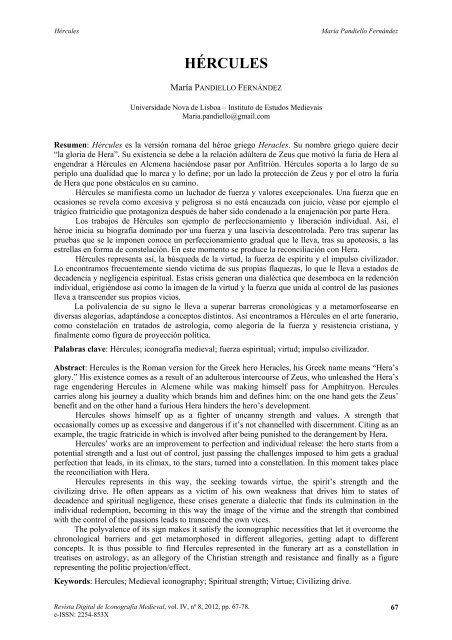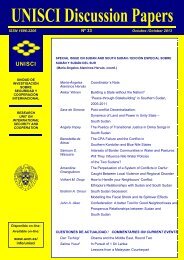Número 8 - Universidad Complutense - Universidad Complutense ...
Número 8 - Universidad Complutense - Universidad Complutense ...
Número 8 - Universidad Complutense - Universidad Complutense ...
You also want an ePaper? Increase the reach of your titles
YUMPU automatically turns print PDFs into web optimized ePapers that Google loves.
Hércules María Pandiello Fernández<br />
HÉRCULES<br />
María PANDIELLO FERNÁNDEZ<br />
<strong>Universidad</strong>e Nova de Lisboa – Instituto de Estudos Medievais<br />
Maria.pandiello@gmail.com<br />
Resumen: Hércules es la versión romana del héroe griego Heracles. Su nombre griego quiere decir<br />
“la gloria de Hera”. Su existencia se debe a la relación adúltera de Zeus que motivó la furia de Hera al<br />
engendrar a Hércules en Alcmena haciéndose pasar por Anfitrión. Hércules soporta a lo largo de su<br />
periplo una dualidad que lo marca y lo define; por un lado la protección de Zeus y por el otro la furia<br />
de Hera que pone obstáculos en su camino.<br />
Hércules se manifiesta como un luchador de fuerza y valores excepcionales. Una fuerza que en<br />
ocasiones se revela como excesiva y peligrosa si no está encauzada con juicio, véase por ejemplo el<br />
trágico fratricidio que protagoniza después de haber sido condenado a la enajenación por parte Hera.<br />
Los trabajos de Hércules son ejemplo de perfeccionamiento y liberación individual. Así, el<br />
héroe inicia su biografía dominado por una fuerza y una lascivia descontrolada. Pero tras superar las<br />
pruebas que se le imponen conoce un perfeccionamiento gradual que le lleva, tras su apoteosis, a las<br />
estrellas en forma de constelación. En este momento se produce la reconciliación con Hera.<br />
Hércules representa así, la búsqueda de la virtud, la fuerza de espíritu y el impulso civilizador.<br />
Lo encontramos frecuentemente siendo víctima de sus propias flaquezas, lo que le lleva a estados de<br />
decadencia y negligencia espiritual. Estas crisis generan una dialéctica que desemboca en la redención<br />
individual, erigiéndose así como la imagen de la virtud y la fuerza que unida al control de las pasiones<br />
lleva a transcender sus propios vicios.<br />
La polivalencia de su signo le lleva a superar barreras cronológicas y a metamorfosearse en<br />
diversas alegorías, adaptándose a conceptos distintos. Así encontramos a Hércules en el arte funerario,<br />
como constelación en tratados de astrología, como alegoría de la fuerza y resistencia cristiana, y<br />
finalmente como figura de proyección política.<br />
Palabras clave: Hércules; iconografía medieval; fuerza espiritual; virtud; impulso civilizador.<br />
Abstract: Hercules is the Roman version for the Greek hero Heracles, his Greek name means “Hera’s<br />
glory.” His existence comes as a result of an adulterous intercourse of Zeus, who unleashed the Hera’s<br />
rage engendering Hercules in Alcmene while was making himself pass for Amphitryon. Hercules<br />
carries along his journey a duality which brands him and defines him: on the one hand gets the Zeus’<br />
benefit and on the other hand a furious Hera hinders the hero’s development.<br />
Hercules shows himself up as a fighter of uncanny strength and values. A strength that<br />
occasionally comes up as excessive and dangerous if it’s not channelled with discernment. Citing as an<br />
example, the tragic fratricide in which is involved after being punished to the derangement by Hera.<br />
Hercules’ works are an improvement to perfection and individual release: the hero starts from a<br />
potential strength and a lust out of control, just passing the challenges imposed to him gets a gradual<br />
perfection that leads, in its climax, to the stars, turned into a constellation. In this moment takes place<br />
the reconciliation with Hera.<br />
Hercules represents in this way, the seeking towards virtue, the spirit’s strength and the<br />
civilizing drive. He often appears as a victim of his own weakness that drives him to states of<br />
decadence and spiritual negligence, these crises generate a dialectic that finds its culmination in the<br />
individual redemption, becoming in this way the image of the virtue and the strength that combined<br />
with the control of the passions leads to transcend the own vices.<br />
The polyvalence of its sign makes it satisfy the iconographic necessities that let it overcome the<br />
chronological barriers and get metamorphosed in different allegories, getting adapt to different<br />
concepts. It is thus possible to find Hercules represented in the funerary art as a constellation in<br />
treatises on astrology, as an allegory of the Christian strength and resistance and finally as a figure<br />
representing the politic projection/effect.<br />
Keywords: Hercules; Medieval iconography; Spiritual strength; Virtue; Civilizing drive.<br />
Revista Digital de Iconografía Medieval, vol. IV, nº 8, 2012, pp. 67-78.<br />
e-ISSN: 2254-853X<br />
67

















